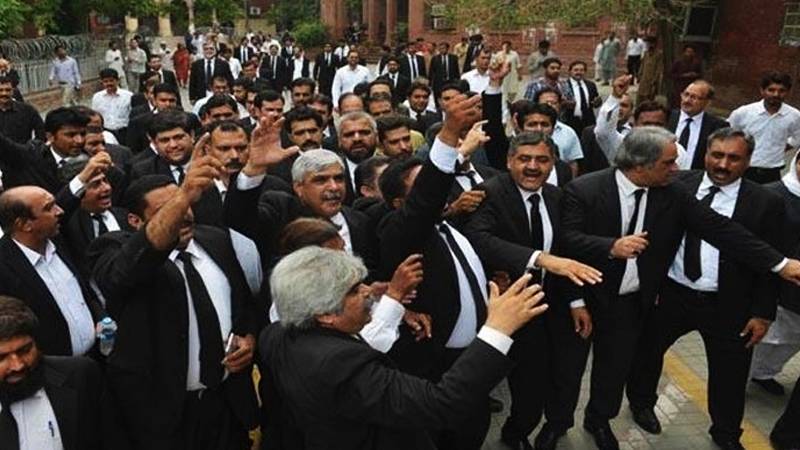
Tensions have risen between the bench and the bar following certain incidents occurring during the tenure of the current Chief Justice of Pakistan Asif Saeed Khosa.
A report in Express Tribune by Hasnaat Malik identified the factors behind the increasing divide between the bar and the bench. It referred to the fact that the farewell dinner organised by Supreme Court Bar Association for outgoing SC judge Justice Sheikh Azmat Saeed remained unattended by several representatives of lawyers. The intensity of tensions can be judged from the fact that many senior lawyers failed to attend the dinner.
Tensions had originated between the bench and bar when Chief Justice Asif Khosa initiated measures to reform the judiciary in the country. The measures that were particularly stressful for bench-bar relations were those related to Sections 22A and 22B of the Criminal Procedure Code and the establishment of model courts.
Consequently, lawyers had boycotted court proceedings, citing their disapproval of these measures. The matter was later peacefully revolved, but tensions surfaced again following the presidential references filed against Justice Qazi Faez Isa of the Supreme Court and Justice KK Agha of the Sindh High Court. This was followed by the Supreme Judicial Council issuing show cause notices to the two judges.
The bar is under the belief that the presidential references against the two judges have been filed with ill intent.
Lawyers across the country have arranged conventions in different cities and have raised questions on the conduct of senior judges who are part of the Supreme Judicial Council.
The president of the Supreme Court Bar Association, Amanullah Kanrani, issued highly critical statements against the top judges while the Pakistan Bar Council has created committees to aid in the identification of incompetent judges so that complaints of misconduct could be filed against them.
Members of the superior bars have also been critical of the chief justice’s call for a movement, ‘Tehreek-Bahali Izat-E-Wukla’, to restore the dignity of the legal fraternity.
Meanwhile, taking notice of Pakistan Bar Council vice chairman’s accusations of nepotism, the Peshawar High Court issued a contempt notice to the vice chairman. Due to this, the federal and provincial bars boycotted court proceedings on Monday.
Several possible reasons exist for the growing divide between the bench and the bar during CJP Khosa’s tenure.
The bar has maintained an anti-establishment stance and has opposed the bench whenever it has taken a pro-establishment stance.
Moreover, Chief Justice Asif Khosa does not have a supportive group of lawyers in the bar like his predecessors Iftikhar Muhammad Chaudhry and Mian Saqib Nisar.
A report in Express Tribune by Hasnaat Malik identified the factors behind the increasing divide between the bar and the bench. It referred to the fact that the farewell dinner organised by Supreme Court Bar Association for outgoing SC judge Justice Sheikh Azmat Saeed remained unattended by several representatives of lawyers. The intensity of tensions can be judged from the fact that many senior lawyers failed to attend the dinner.
Tensions had originated between the bench and bar when Chief Justice Asif Khosa initiated measures to reform the judiciary in the country. The measures that were particularly stressful for bench-bar relations were those related to Sections 22A and 22B of the Criminal Procedure Code and the establishment of model courts.
Consequently, lawyers had boycotted court proceedings, citing their disapproval of these measures. The matter was later peacefully revolved, but tensions surfaced again following the presidential references filed against Justice Qazi Faez Isa of the Supreme Court and Justice KK Agha of the Sindh High Court. This was followed by the Supreme Judicial Council issuing show cause notices to the two judges.
The bar is under the belief that the presidential references against the two judges have been filed with ill intent.
Lawyers across the country have arranged conventions in different cities and have raised questions on the conduct of senior judges who are part of the Supreme Judicial Council.
The president of the Supreme Court Bar Association, Amanullah Kanrani, issued highly critical statements against the top judges while the Pakistan Bar Council has created committees to aid in the identification of incompetent judges so that complaints of misconduct could be filed against them.
Members of the superior bars have also been critical of the chief justice’s call for a movement, ‘Tehreek-Bahali Izat-E-Wukla’, to restore the dignity of the legal fraternity.
Meanwhile, taking notice of Pakistan Bar Council vice chairman’s accusations of nepotism, the Peshawar High Court issued a contempt notice to the vice chairman. Due to this, the federal and provincial bars boycotted court proceedings on Monday.
Several possible reasons exist for the growing divide between the bench and the bar during CJP Khosa’s tenure.
The bar has maintained an anti-establishment stance and has opposed the bench whenever it has taken a pro-establishment stance.
Moreover, Chief Justice Asif Khosa does not have a supportive group of lawyers in the bar like his predecessors Iftikhar Muhammad Chaudhry and Mian Saqib Nisar.
